- Home
- Markus Zusak
I Am the Messenger Page 6
I Am the Messenger Read online
Page 6
I go out to the athletic field every morning before I head off for work, and she's there. Every day, without fail. One morning the rain pours down, and still she's there.
On a Wednesday, I take a day off work (telling myself it's the kind of sacrifice you're required to make when you've got a higher calling). With the Doorman in tow, I walk to the school at around three o'clock. She comes out with a few friends, which gladdens me because I hoped she wouldn't be alone. Her shyness made me worry about that.
It's funny how when you watch people from a long distance, it all seems voiceless. It's like watching a silent movie. You guess what people say. You watch their mouths move and imagine the sounds of their feet hitting the ground. You wonder what they're talking about and, even more so, what they might be thinking.
The strange thing I notice as I watch is that when a boy comes along and talks to the girls and walks with them, the running girl shifts back into the mode of looking to the ground. When he leaves she's all right again.
I stand and wonder for a while and conclude that she probably just lacks confidence, like me.
She probably feels too tall and gawky, not realizing how beautiful everyone knows she is. I think if it's only that, she'll be okay soon enough.
I shake my head.
At myself.
Listen to you, I tell me, saying she'll be okay. How the hell would you know? Is it because you've turned out okay, Ed? I very much doubt it. I'm absolutely right. I have no business plotting or predicting anything for this girl. I only have to do what I'm supposed to do and hope it'll be enough.
A few times, I watch her house at night.
Nothing happens.
Ever.
As I stand there and contemplate the girl, and old Milla, and the dread of Edgar Street, I realize I don't even know this girl's name. For some reason I imagine it to be something like Alison, but mostly I just think of her as the running girl.
I go to the athletics meet that's on every weekend during summer. She's there and I find her sitting with the rest of her family. There's a younger girl and a small boy. They all wear black shorts and a light blue tank top with a rectangular patch sewn on the back. The girl's patch has number 176 on it, just under the slogan that says You've Gotta Be Made of Milo.
The under-fifteens' fifteen hundred meters is called, and she stands up, brushing dried grass from her shorts.
"Good luck," her mother says.
"Yeah, good luck, Sophie," the father echoes.
Sophie.
I like it.
I hear it in my mind and place the name carefully to her face. It fits nicely.
She's still brushing the grass from her shorts when I remember the other two kids even exist--once they were gone I was able to focus completely on Sophie. The girl's out doing shot put, and the boy's gone off somewhere to play army men with an ugly little bastard called Kieren.
"Can I go with Kieren, Mum? Please?"
"All right, but make sure you're listening out for your events--the seventy meters is coming up."
"Okay. Let's go, Kieren."
For a moment I feel glad to be called simple, no-problems Ed. Not Edward, Edmund, Edwin. Just Ed. Sheer mediocrity feels nice for a change.
Sophie sees me once she stands up, and a small piece of contentment finds itself on her face. She looks happy to see me, but she still turns from me almost straightaway. She walks to the marshaling area with a pair of crappy old spiked shoes in her hand (I assume the older kids are allowed to wear them in the longer races) when her father calls out again.
"Hey, Soph."
She turns to face him.
"I know you can win it--if you want it."
"Thanks, Dad."
She walks hurriedly away, turning once more to where I sit in the sun, shoving a Lamington into my mouth. There's acoconut sprinkle stuck to the side of my lips, but it's too late to remove it. She wouldn't see it, anyway. Not from that distance. She only gives me a quick glance and goes on. I know what I have to do now.
If I was a cocky sort of guy, I'd tell you this one's a piece of piss. A snack.
But I'm not.
I can't bring myself to say it because I still think of Edgar Street. I realize that for every good message, there will always be one that will agonize me. So I'm thankful for this. It's a nice day, and I like this girl. I like her even more when she runs alongside another tall and skinny girl who always looks like she's got the wood on her. They run together, but at the end, the other girl finishes more strongly. Her stride lengthens, and a man keeps yelling, "Go, Annie! Go, Annie! Dig 'em in, love! Dig 'em in! Beat her, darlin', you can do it!"
I'd rather come in second than have shit like that yelled at me.
Sophie's father is different.
For the race he goes down to the fence and watches intently. He yells nothing. Only watches. At times, I can sense some tension in him as he wills his daughter ahead of the other girl. When the other one nudges ahead, he looks briefly over to the other father, but that's all. When she wins, he applauds her, and he applauds Sophie, too. The other father only stands there with obscene pride, as if it was he who'd just run his stomach out and won the race.
When Sophie comes and stands next to her father, he puts his arm around her. Her disappointment is written heavily across her shoulders.
In a way, Sophie's dad reminds me of my own father, except my own father never put his arm around me. Not to mention he was an alcoholic. It's in his mannerisms and his quietness. My own father was a quiet man who never had a bad word for anyone. He'd go to the pub and stay there till closing. He'd walk the streets to sober up but it never quite worked. Still, I must say, he'd get up and make it to work the next day without fail. My ma would rant and rave and scream abuse at him for being out, but he never reacted. He never told her off in return.
Sophie's father looks the same, except for the alcoholic part. In short, he looks like a gentleman.
They walk back to the mother together and sit there on the hill. The father and mother hold hands as Sophie drinks one of those sports drinks. They look like the type of family who tell each other they love each other when they go to bed, and when they wake up, and before they go to work.
The spiked shoes come off Sophie's feet. She looks at them and sighs, "I thought these were meant to be good luck." I can only assume they've been handed down from her mother or perhaps another successful relative.
As they sit on the ground, I take a closer look at those shoes. They're a faded blue and yellow. They're old and worn through.
And they're wrong.
The girl deserves better.
"Haven't seen you for a while."
"I've been busy."
Audrey and I are on my front porch, drinking cheap alcohol, as usual. The Doorman comes out and asks for some, but I give him a big pat instead.
"You still getting those cards in the mail?" She knew all along of course that I was lying about throwing out the diamonds. No one in their right mind would throw diamonds out, would they? They're valuable. If anything, they need protecting.
Milla, I think. Sophie. The woman on Edgar Street and her daughter, Angelina.
"No, I'm still on the first one."
"Do you think there'll be more?"
I think about it and can't figure out if I want another one or not. "The first one's hard enough." We drink.
I drop in regularly at Milla's place, and she shows me her photos again and I continue reading from Wuthering Heights. I'm actually starting to like it. The cake got finished a few nights ago, thank God, but the old lady's as nice as ever. Shaky as hell but nice as ever.
Sophie loses again the next week at athletics, this time in the eight hundred. She doesn't run the same in those patchy old shoes. She needs something better to even come close to how she runs in the mornings. That's when she's true. She's apart. Almost out of herself.
Early next Saturday morning, I go to her house and knock on the door. Her father answers.
"Can I help you?"
I feel nervous, like I've come to convince him to let his daughter go out with me. I'm holding a shoe box in my right hand, and the man looks down at it. Quickly, I lift it and say, "I've got a delivery for your daughter Sophie. I hope they're the right size."
The shoe box passes between our hands, and the man looks confused.
"Just tell her a guy brought her some new shoes."
The man looks at me as if I'm heavily intoxicated. "Okay." He tries his hardest not to mock me. "I will."
"Thank you."
I turn around and start walking away, but he brings me back. "Wait," he calls out.
"Yes, sir?"
He holds the box out, puzzled, lifting it into the conversation.
"I know," I say.
The box is empty.
I haven't shaved, and I feel like death warmed up at the track. I didn't bring the cab in till six this morning and went straight over to Sophie's place and over to the track. I've got a sausage roll for breakfast and some coffee.
She gets called for the fifteen hundred, and she goes barefoot.
I smile at the thought of it.
Barefoot shoes...
"Just don't let her get stepped on," I say.
A few minutes later, her father approaches the fence. The race begins.
The other dickhead starts yelling out.
And Sophie gets tripped up on the back straight after a lap.
She falls among the lead group of five, and the rest of them stretch out, up to maybe twenty-five meters in front. When she gets back up, it reminds me of that bit in Chariots of Fire when Eric Liddell falls over and runs past everyone to win.
There are two laps to run, and she's still well behind.
She gets the first two runners easily, and she's running like she does in the morning. There's no strain. The only thing you can see on her is the feeling of freedom and the purest sense that she's alive. All she needs is the hood and the red pants. Her bare feet carry her past the third one, and soon she's up alongside her nemesis. She goes past her and holds her with two hundred to go.
Just like the mornings, I think, and people have stopped to watch. They saw her fall and stand and keep going. Now they watch her out in front, beyond everything that's ever been done on a normal weekend in this town. The discus has stopped, and the high jump. Everything has. All there is is the girl with the sunshine hair and the killer voice breathing and being in front.
The other girl comes at her.
She pushes for the lead.
There's blood on Sophie's knees, from the fall, and she also got spiked, I think, but this is how it has to be. The last hundred meters nearly kill her. I can see the pain tightening on her face. Her bare feet bleed on their way across the balding grass. She almost smiles from the pain--from the beauty of it. She's out of herself.
Barefoot.
More alive than anyone I've ever witnessed.
They run at the line.
And the other girl wins.
Like always.
As they go over the line, Sophie collapses, and down there, on the ground, she rolls onto her back and looks up at the sky. There's ache in her arms and ache in her legs and heart. But on her face is the beauty of the morning, and for the first time, I think, she recognizes it: 5:30 a.m.
Sophie's father claps, like always, only this time, he's not alone. The other girl's father claps now, too.
"That's a hell of a daughter you got there," he says.
Sophie's father only nods modestly and says, "Thank you. So have you."
I throw my Styrofoam coffee cup in the bin with my sausage-roll wrapper and begin to walk away. As usual, I've got sauce all stuck on my fingers.
I can hear her feet behind me, but I don't turn around. I want to hear her voice.
"Ed?"
It's unmistakable.
I turn around and smile at a girl who's got blood on her knees and feet. From her left knee, it runs crookedly down her shin. I point to it and say, "You better get that looked after."
Calmly she answers. "I will."
Some discomfort stands between us now, and I know I don't belong here anymore. Her hair's out and it's beautiful. Her eyes are worth drowning in, and her mouth speaks to me.
"I just," she says, "wanted to say thanks."
"For getting you spiked and hurt?"
"No." She refuses my lie. "Thanks, Ed."
I give in. "It's a pleasure." My voice sounds like gravel compared to hers.
When I step closer, I notice she doesn't look away from me now. She doesn't tilt her head or send her eyes to the ground. She lets herself look and be with me.
"You've got beauty," I tell her. "You know that, don't you?"
Her face goes a little red as she accepts it.
"Will I see you again?" she asks, and to be honest, I think I'll regret what I say next.
"Not at five-thirty in the bloody morning."
She twists on one of her feet, laughing, silently, to herself.
I'm about to leave when she asks, "Ed?"
"Sophie?"
It shocks her that I know her name, but she goes on. "Are you some kind of saint or something?"
Inside, I laugh. Me? A saint? I list what I am. Taxi driver. Local deadbeat. Cornerstone of mediocrity. Sexual midget. Pathetic cardplayer.
I say my final words to her.
"No, I'm not a saint, Sophie. I'm just another stupid human."
We smile a last smile, and I walk away. I feel her watching me, but I don't look back.
It feels like the mornings clap their hands.
To make me wake.
In the mornings of my eyes, I see three things each time.
Milla.
Sophie.
45 Edgar Street.
The first two hold me up with the rising of the sun. The third strips me and hands shivers to my skin and to my flesh and bones.
I spend the late of each night watching repeats of Dukes of Hazzard. The big fat guy always sits there eating marshmallows at his desk. What's that bloke's name again? I asked myself when I saw the first episode. Then Daisy came on-screen and said, "What's up, Boss Hogg?"
Boss Hogg.
Of course.
God, Daisy looks fantastic in her tight jeans. Each night when I see her my pulse quickens immeasurably, but she's always gone quicker than she arrives.
The Doorman shoots me a dirty look every time.
"I know," I say.
But then she comes on again and there's no point arguing. Beautiful women are the torment of my existence.
The nights and Dukes pass by.
I drive my cab with a headache that waits behind me. Every time I turn around, it's there.
"Thanks, mate," I say. "That'll be sixteen fifty."
"Sixteen fifty?" whinges the old guy in his suit. His words are like froth in my head, boiling, rising, and falling.
"Just pay up." I don't have the patience for this today. "You can walk next time if it costs too much." I'm sure he puts it on his company's account, anyway.
He gives me the money and I thank him. Wasn't so difficult now, was it? I think. He slams the door hard. My head may as well have been in it.
In a way, I'm waiting for another phone call to arrive at my place, telling me to get over to Edgar Street again, pronto. I wait a few nights, but there's nothing.
On Thursday night, I leave the card game at Audrey's early. A feeling clutters me. It makes me stand up and leave, almost without saying a word. The time has arrived, and I know I need to be standing outside that house at the end of Edgar Street--a house held up by the violence that occurs inside it almost every night.
As I walk there, I realize I'm hurrying. I've had the success I felt I needed.
Milla and Sophie.
Now I have to face this.
I turn onto Edgar Street, forming fists inside my jacket pockets. I check to see that no one's watching me. With Milla and Sophie, I always felt at ease. They were the nice ones. There
was practically no risk involved, unlike here, where all the answers seem to be painful ones. For the wife and the girl and for the husband. And me.
Waiting, I pull a forgotten piece of chewing gum from my pocket and put it in my mouth. It tastes like sickness, like fear.
The feeling escalates when the man comes down the road and walks up the porch steps. Silence moves closer then. It clips me, pushing past.
It happens.
The violence interferes. It sticks its fingers into everything and tears it open. It all comes apart, and I loathe myself for waiting this long to end it. I despise myself for taking the easy options night after night. A hatred is wound up and let go in me. It hacks at my spirit and brings it to its knees, next to me. It coughs and suffocates as my own hatred for myself becomes overwhelming.
The door, I tell myself. Go to the door--it's open.
But I don't move.
I don't move because my cowardice tramples me, even as I try to lift my spirit from its knees. It only keels over. It sways off to the side and hits the earth with a silent, beaten thud. It looks up at the stars. They're stars that dribble across the sky.
Go, I tell myself again, and this time, I walk on.
Everything shakes as I walk up the porch steps and stand at the door. Distant clouds watch me, but they're backing away. The world wants nothing to do with this. I don't blame it.
Inside, I hear them.
He's waking her in every moment.
Disturbing her.
Reaching through her and abandoning her at the same time.
He throws her down and takes her and cuts her open. The bedsprings leak--a howling, desperate noise of falling down and springing up, even though they don't want to. Refusal is pointless. Complaint has no use. Some crying crawls to the doorway where I stand. It hobbles out from the gap in the door and lands at my feet.
How can you not go in? I ask myself, but still I wait.
The door opens a little more, and a presence stands there now, opposite me. It's the girl.
The girl is in front of me, planting her fist in her eye to wrestle out the sleep that has lodged there. She wears yellow pajamas with red boats on them, and her toes curl and rub together.
She looks at me, but without fear. Anything's better than where she's coming from.
In a whisper, she asks, "Who are you?"

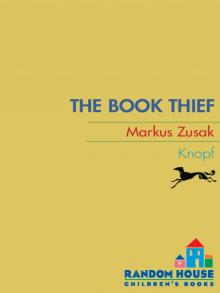 The Book Thief
The Book Thief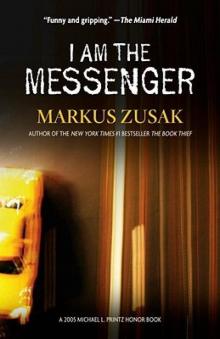 I Am the Messenger
I Am the Messenger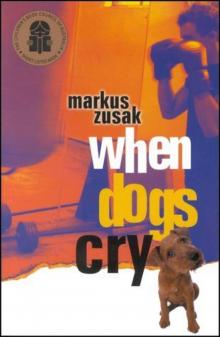 When Dogs Cry
When Dogs Cry Underdogs
Underdogs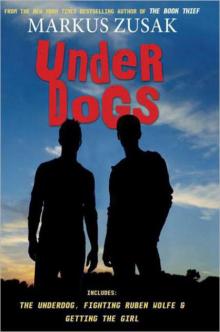 Underdogs: Three Novels
Underdogs: Three Novels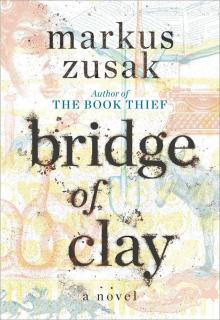 Bridge of Clay
Bridge of Clay